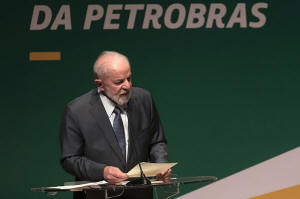Brazil to join OPEC+, group of major oil-exporting nations
 Send a link to a friend
Send a link to a friend
 [February 19, 2025] By
FABIANO MAISONNAVE [February 19, 2025] By
FABIANO MAISONNAVE
BRASILIA, Brazil (AP) — Brazil’s government on Tuesday approved joining
OPEC+, a group of major oil-exporting nations, signaling the country’s
evolution into a major oil state just nine months ahead of hosting the
United Nations’ annual climate summit.
The National Council for Energy Policy’s approval came in response to an
official invitation in 2023. The group includes the 12 members of OPEC,
the longstanding group set up to coordinate oil production to stabilize
markets, plus 10 more significant oil-producing nations with Russia by
far the largest.
Though non-OPEC members agree to cooperate with OPEC nations, Brazil
won’t have any binding obligation such as production cuts, Mines and
Energy Minister Alexandre Silveira said at a news conference. The
participation will be limited to the Charter of Cooperation, a permanent
forum for OPEC and OPEC+ countries to discuss industry-related issues.
The South American country will not participate in decisions.
Silveira called the charter merely “a forum for discussing strategies
among oil-producing countries. We should not be ashamed of being oil
producers. Brazil needs to grow, develop and create income and jobs.”
President Luiz Inácio Lula da Silva began his third term in 2023 touting
himself as an environmental defender, and has worked to reduce
deforestation in the Amazon rainforest and to protect Indigenous rights.
But he has also argued that new oil revenues could finance a transition
to green energy.

In recent weeks, he has pressed the country’s environmental regulator to
approve exploratory drilling near the mouth of the Amazon River, one of
the most biodiverse regions of the world.
Brazil is the world’s seventh-largest oil producer, with about 4.3
million barrels daily, or 4% of the world´s output, according to Energy
Information Administration, a U.S. government agency. In 2024, crude oil
became the country´s top export product, accounting for 13.3% of
Brazil’s foreign sales, surpassing soy.
[to top of second column] |

Brazil's President Luiz Inacio Lula da Silva speaks during the
inauguration ceremony for the new president of the state-run oil
company Petrobras, in Rio de Janeiro, Brazil, June 19, 2024. (AP
Photo/Bruna Prado, File)
 The U..S. is the world’s largest
producer at nearly 22 million barrels daily, with Saudi Arabia, the
largest producer in OPEC, at about 11 million barrels.
Brazil´s move is “comprehensive and coherent,” said Luís Eduardo
Duque Dutra, an oil expert and a professor in the chemistry
department at the Federal University of Rio Janeiro. He noted that,
along with OPEC+, the energy council also approved the country´s
membership in two other bodies, the International Energy Agency and
the International Renewable Energy Agency.
“This helps keep track of the global situation, matching the
country’s growing importance after developing pre-salt (offshore
oil) reserves and its wind and solar energy potentials,” he told The
Associated Press. He also said Brazil would benefit from relations
with the other countries: “In times of trade wars, information is as
valuable as gold.”
Lula’s pursuit of increased oil production, however, has met
criticism as Brazil prepares to host the UN climate summit known as
COP30 in November. A central push of the annual climate talks has
been to reduce the use of fossil fuels, which when burned releases
greenhouse gases that heat the planet.
“Brazil’s entrance to any OPEC body is another sign of the
government’s setback,” says Suely Araújo, a spokesperson of the
Climate Observatory, a network of 133 environmental, civil society
and academic groups. Opening up new areas for fossil fuel
exploration “indicates that we are choosing solutions from the past
in the face of a huge challenge for the present and the future,”
Araujo said.
All contents © copyright 2025 Associated Press. All rights reserved |